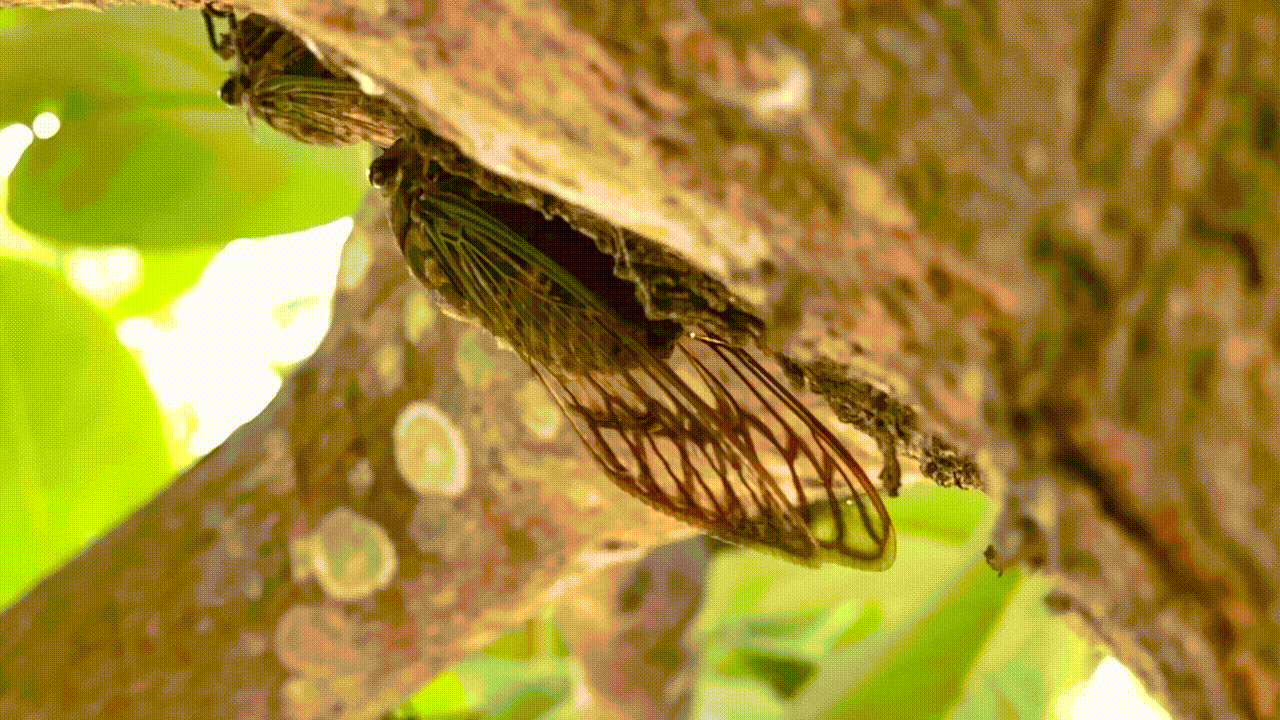biomimicry
Meet the Brazilian Velvet Ant, a Rare 'Ultra-Black' Wasp That's So Dark It Absorbs Almost All Visible Light
While the distinctive coloration is thought to be a warning to predators, it also has intriguing implications for designing man-made materials
Scientists Unlock the Secrets of Crocodile Skin and Its Irregular, Mystifying Patterns
The scales on crocodiles’ heads are very different from the skin appendages of other animals and even distinct from the scales on the rest of their bodies
14 Fun Facts About Dragonflies, From Their Lethal Hunting Prowess to Incredible Migratory Feats
The colorful insects can help humans by eating mosquitoes and will gather in mysterious swarms
These Frankenstein-Like Sea Creatures Can Actually Fuse Their Bodies Together
Two comb jellies can merge their digestive and nervous systems and even sync their bodily functions, according to new research. The discovery could have implications for human medicine
From Silk Moths to Fruit Flies, These Five Insects Have Changed the World
It’s easy to write bugs off as pests, but consider the ways in which they have positively impacted our lives
How an Elephant's Wrinkles Reveal Whether It Is Right- or Left-Trunked
A new study sheds light on the muscular, dexterous appendage, suggesting trunk wrinkles are more important than many people realize
Your Microwave Is Teeming With Bacteria, Study Suggests
Researchers found thriving communities of microbes in microwave ovens used in home kitchens, shared spaces and laboratories
Swimming in Schools May Help Fish Save Energy in Turbulent Waters
A new study suggests schooling fish use up to 79 percent less energy in rough conditions than fish that swim alone
How Deep-Sea Comb Jellies Hold Their Shape Under Crushing Pressure
The delicate sea creatures fall apart when brought to the surface but can survive miles deep in the ocean due to special cell wall structures, according to a new study
Chimpanzees May Self-Medicate With Plants, Using the Forest as a Pharmacy
New research suggests sick chimps seek out and eat plants with antibacterial and anti-inflammatory properties—a finding that could advance drug discovery for humans
Bizarre Sex Helped Anglerfish Diversify and Dominate the Deep Sea, Study Suggests
Some of these fish perform obligate parasitism, in which males attach to—and then fuse bodies with—the much-larger females
How Spider Silk Could Inspire Microphones of the Future and Revolutionize Sound Design
Spiderwebs can pick up vibrations in air flow caused by sound waves, and researchers say microphones designed this way could become more sensitive and compact
Don't Look Up: Cicadas Produce High-Speed Jets of Urine
The noisy, winged insects produce pee the same way that much larger animals do, according to a new study
How Are Tardigrades So 'Indestructible?' Scientists Finally Have an Explanation
The tiny animals nicknamed "water bears" can endure extreme conditions by entering a deep hibernation with a switch at the molecular level, a new study finds
DNA From the Ocean's 'Twilight Zone' Could Lead to New Lifesaving Drugs, Scientists Say
Researchers catalogued the genes of more than 300 million groups of marine bacteria, viruses and fungi in hopes that the database could lead to breakthroughs in medicine, energy and agriculture
These Ants Can Diagnose and Treat Their Comrades' Infected Wounds
Matabele ants in sub-Saharan Africa often sustain injuries while hunting termites—and their survival strategy may help humans fight infections, too
Seven Scientific Discoveries From 2023 That Could Lead to New Inventions
Biologists learned lots about animals and plants this year, and their findings could inspire better robots, medicine and environmental technologies
Watch How Hummingbirds Fly Through Narrow Spaces
Slow-motion video revealed the birds take two different approaches: flying sideways or pinning their wings back and darting like a bullet
This Desert Plant's Salty 'Sweat' Can Collect Water From the Air
The athel tamarisk's hydration trick could improve on human techniques to harvest water in dry environments, researchers say
How Kingfishers Dive Head-First Into Water Without Getting Concussions
Thanks to a new genetic analysis of 30 kingfisher species, researchers are one step closer to understanding the birds' dramatic hunting style
Page 1 of 2
:focal(250x250:251x251)/https://tf-cmsv2-smithsonianmag-media.s3.amazonaws.com/filer_public/fb/a2/fba29dca-b578-4145-b6a0-7b6518be5e0c/medium_1.jpg)
:focal(249x297:250x298)/https://tf-cmsv2-smithsonianmag-media.s3.amazonaws.com/filer_public/82/2d/822df92e-385b-4b0e-a4c8-9a48b1b4816e/1024px-nile_crocodile_head.jpg)
:focal(2809x1873:2810x1874)/https://tf-cmsv2-smithsonianmag-media.s3.amazonaws.com/filer_public/58/37/5837ad0a-72fd-4eb1-aed7-c5ff1ae3dfad/gettyimages-1435490940.jpg)
:focal(892x892:893x893)/https://tf-cmsv2-smithsonianmag-media.s3.amazonaws.com/filer_public/da/fd/dafd5ea1-2de9-4b0a-9a9a-b5d3079e3be9/screen_shot_2024-10-08_at_121826.png)
:focal(1009x745:1010x746)/https://tf-cmsv2-smithsonianmag-media.s3.amazonaws.com/filer_public/8e/88/8e88895c-c55b-4a1c-8419-95a9ec25b4bf/gettyimages-987257254.jpg)
:focal(2405x1548:2406x1549)/https://tf-cmsv2-smithsonianmag-media.s3.amazonaws.com/filer_public/0d/97/0d971ea6-3972-43e5-8242-f0791464a96c/elephant_running.jpg)
:focal(640x427:641x428)/https://tf-cmsv2-smithsonianmag-media.s3.amazonaws.com/filer_public/e7/f2/e7f24549-f508-4363-aab0-6eb2aa8a96c7/kitchen-7706307_1280.jpg)
:focal(400x267:401x268)/https://tf-cmsv2-smithsonianmag-media.s3.amazonaws.com/filer_public/8a/c2/8ac2313e-8451-4a92-9118-cbec3d3ece70/school_jacks_klein.jpeg)
:focal(1060x713:1061x714)/https://tf-cmsv2-smithsonianmag-media.s3.amazonaws.com/filer_public/78/11/7811e0eb-8364-458a-a9b4-14a582663169/gettyimages-90050101.jpg)
:focal(2568x1712:2569x1713)/https://tf-cmsv2-smithsonianmag-media.s3.amazonaws.com/filer_public/0d/00/0d00e8c6-566a-4abc-8a18-1b04d9ef5e3b/gettyimages-200207474-001.jpg)
:focal(299x236:300x237)/https://tf-cmsv2-smithsonianmag-media.s3.amazonaws.com/filer_public/59/2e/592ea0f4-c462-4982-b93f-4131ba9f6f7f/bufoceratias.jpg)
:focal(350x237:351x238)/https://tf-cmsv2-smithsonianmag-media.s3.amazonaws.com/filer_public/b9/e4/b9e4e4b0-e9e2-4594-a7a6-0fb774c2a52d/orbweaver.jpg)

:focal(1061x707:1062x708)/https://tf-cmsv2-smithsonianmag-media.s3.amazonaws.com/filer_public/08/8a/088a219f-a9a0-4df3-9bb0-1bc3a9d6ebee/gettyimages-1155265547.jpg)
:focal(1061x707:1062x708)/https://tf-cmsv2-smithsonianmag-media.s3.amazonaws.com/filer_public/90/26/9026ff8a-369d-48b7-b186-60f65ebccc60/gettyimages-988823298.jpg)
:focal(640x396:641x397)/https://tf-cmsv2-smithsonianmag-media.s3.amazonaws.com/filer_public/b1/d7/b1d7a054-f8e7-4abb-981e-59c4c3931bf8/csm_0102ameisenerkennen1www_9587540f09.jpg)
:focal(960x649:961x650)/https://tf-cmsv2-smithsonianmag-media.s3.amazonaws.com/filer_public/52/0c/520c1e9a-9a4e-4182-a0e6-2530427f0848/monarch-butterfly.jpg)
:focal(867x562:868x563)/https://tf-cmsv2-smithsonianmag-media.s3.amazonaws.com/filer_public/28/04/28047578-43cf-4989-89ab-2219f0211797/hummingbird_2000px.jpg)
:focal(400x267:401x268)/https://tf-cmsv2-smithsonianmag-media.s3.amazonaws.com/filer_public/90/f0/90f03417-877a-48d3-8828-36f0515a4987/nyu-abu-dhabi-research-1_resize.jpg)
:focal(1640x1093:1641x1094)/https://tf-cmsv2-smithsonianmag-media.s3.amazonaws.com/filer_public/20/c7/20c74bbf-c59b-45dc-8899-fbda43b70d48/gettyimages-1068204378.jpg)